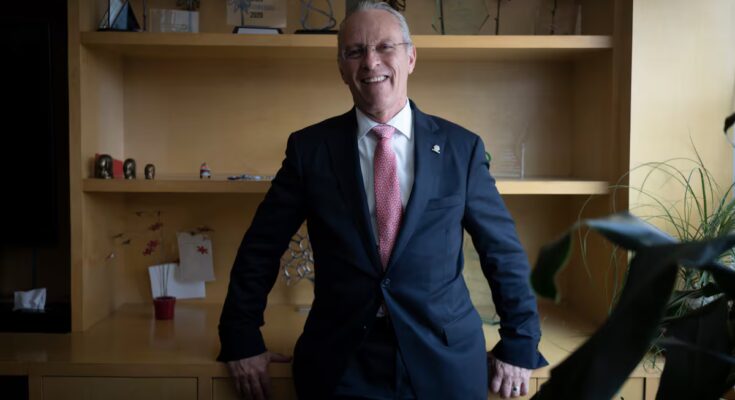The Business Coordination Council will renew its presidency in December with a single candidate. The arrival of José Medina Mora Icaza, with a more direct style than the current president of the CEC, is not an affront to president Claudia Sheinbaum, nor the rebirth of business activism with a citizen’s cause, but rather an attempt by the employers’ association to alleviate its crisis of representation inside and outside the sphere of money.
Since Obadorism won the presidency of the Republic in 2018, the owners of capital have played a game whose rules were established decades ago, when the old PRI taught them to submit without flinching, to protest without making too much noise, to coexist to win.
With the triumph of López Obrador seven years ago, and with the arrival of Sheinbaum in 2024, the families of the largest economic emporiums have been able, in general terms, to adapt to the new times and lose little or nothing in the attempt.
Those who ignore the above would be wrong to believe that the arrival, in a month’s time, of Medina Mora Icaza as president of the CEC represents a challenge from entrepreneurs to the president, or even a change in the strict coordinates in the relationship between capital and power. Nothing like that.
On the other hand, it is easier to see that in a Gatopardist move, the captains of the sectors who decide who will lead them collectively have finally taken into account the double crisis of representativeness that the presidency, since March 2022, of Francisco Cervantes has entailed.
Paco, as friends and acquaintances call him, is not to blame. He presented himself for what he was: a manager. In their hands, the CCE was led by someone who did not inspire authority either among the thousands of entrepreneurs in the country or in the government, because this was decided by those who truly govern, who are none other than the members of the leadership board, the men and women (little represented) of the Mexican Business Council. What they agreed upon, when they appointed Cervantes, was to have only one drive belt, as docile and available as necessary. And he fulfilled them.
So, when the name of Medina Mora appears as the new head of the CCE, for some it is logical to deduce that the employers’ association has opted for a change of direction, for an interlocutor known for a more frontal style and for an agenda less condescending to Obradorism. There is no need to come to this conclusion so soon.
Before doing so, it is worth remembering what kind of tango the capital and Sheinbaum’s presidency can and want to dance, and then see if Medina Mora Icaza is really destined to try to change pace, or simply not lend itself to the business parade with Obadorismo.
The upper hand in this relationship lies with the Presidency of the Republic. This is a change in status compared to 2018. And in some ways a return to the past in two senses, to an openly statist model and to a narrowing of the business community, not without specific compensations.
In her recently published book, President Sheinbaum states that until 1982 “the Mexican state was the main engine of national development. Public, social and private enterprises existed according to a mixed economy model that is still present in the Constitution…”.
It is not, of course, his only statement of nostalgia for the times that, true to Morenoist creed, would worsen with the arrival of the neoliberals in 1982: “Despite the corruption that marked many governments of that time, public enterprises, together with private and social investments, promoted national development and enabled policies of redistribution and social mobility.”
Finally, in his “Diary of a historical transition” and speaking of the works carried out by López Obrador with the support of the army, he underlines that it has been demonstrated “that the State can and must be the director of a development that combines economic growth with social justice”.
The president does not lie or hide which way his heart beats. The State, which will preside until 2030, is the axis of development. And, of course, it accepts the coexistence and even collaboration of private investment. But in this order. An order, as I mentioned before, nothing new for the barons of the Mexican capital.
The CCE is one of the organizations created precisely to overcome the imperial presidencies of the PRI hoped for by Sheinbaum. The CCE is the arm of the Mexican Business Council and is, in the style of the old PRI, a not necessarily democratic conglomerate. Those who have governed have been governing for almost half a century. Because some of the most influential fortunes at the top of the bodies were either made despite the PRI, or thanks to the conditions of that model, or, the Obradorists would say, they grew exponentially with the privatization of public companies when Miguel de la Madrid arrived in Los Pinos and, just by chance, practically none of them, as López Obrador himself boasted in public, weakened after the arrival of the new model, the one that promised to separate economic power from political power.
The members of the Mexican Business Council do not have a bad relationship with the president and above all they have not developed an agenda different from the one they have been carrying out since they replaced Carlos Salazar, their first president under López Obrador, in the CCE.
Salazar, who left FEMSA, one of the most powerful companies in Mexico, attempted a hybrid relationship with the former president: seeking an agreement without giving up dissent.
With a pragmatic sense and aware that the 2018 majority vote represented a step backwards compared to the postulates of the Mexican capital, the man from Monterrey wanted to be receptive towards the new president. He opted for the construction of a bridge with the National Palace, but his efforts were not always rewarded by an executive who signaled his clear determination of power when, even without having assumed the presidency, he canceled the new airport in Mexico, despite the progress of the works and the costs of compensation. Salazar will end up being cooled by the native of Tabasco and that is where Cervantes, an obsequious yes, sir where they are.
Paraphrasing the nickname Morena gave herself, the fourth transformation of the Mexican business community was worth seeing: from soldiers of the PRI (Azcárraga dixit) who brought huge grants to the campaigns of the Salinista tricolor, to agents of privatization and opening of the markets, with a moderate political agenda for alternation, to, since 2000, promoters of a culture of responsibility. These three stages were diluted, not completely but almost, with the triumph of López Obrador, when without declaring themselves soldiers again, they contributed money when asked in the Palace, signed price limits when they were out of control and, obviously, forgot their agenda of promoting counterweights.
So why appoint Medina Mora Icaza who, as president of COPARMEX, followed its rebellious tradition? Because the entrepreneurs have a fundamental problem and need to borrow some of their credibility from the new CCE leader.
In these Cervantes years, the CCE has not been an actor that protests, questions or even enriches the most unexpected decisions of the transition between López Obrador and Sheinbaum. Plan C, which envisaged the destruction of the autonomous organizations and the previous Judicial Power, had the support of large entrepreneurs, able to complain in a very low voice without losing their smile in the face of the avalanche of centralizing power, which entails a reduction in the scope of the legal figure of protection.
Likewise, the CCE and therefore the Mexican Business Council do not gravitate when representatives of entrepreneurs are murdered (as this year in Baja California or Tamaulipas), or entire productive areas are engulfed by extortion – with the execution of lemon trees, for example – or even to demand that the theft of goods and automotive transport stop. The CCE’s voice did not even remotely resemble that of the late Carlos Manzo.
Medina Mora Icaza can be the spokesperson for the entrepreneurs for whom the CCE does not speak today. So the crisis of downward representation of a markedly capitalist, i.e. centralist, business leadership could ease somewhat with the arrival of a president who, firstly, resides in Guadalajara and, secondly, is accustomed to the more federalist agenda of COPARMEX, which he has presided over since 2020.
But let no one be confused. This does not mean that the CCE will enter a phase of activism or rudeness. Medina Mora Icaza knows that those who have the royal handle of the Palace are those of the Council of Mexican Affairs and that he inherits a very worn acronym.
It will be interesting to see how a space will be created for a new presence in the public debate, a weight that has been lost, even in the media, since the arrival of Cervantes. The question is whether Claudia Sheinbaum, even more vertical than López Obrador, will open the door to that new voice.
Because if anyone forgets the president’s executive style and lack of willingness to negotiate, there are two recent examples for the forgetful: he told the CNTE teachers that he doesn’t see the need for their mobilizations, and he asked the entrepreneur Ricardo Salinas Pliego to just pay, even before the Supreme Court condemned him. Negotiate?
Medina Mora Icaza can make top businessmen open their eyes to what those trying to do business across the country suffer, including dealing with an unregulated SAT. It would be a great achievement. But from there until you get to negotiating with the president, that’s another thing. Something that not even the fortunes who today, even when negotiating investments, sit down to talk to you, don’t want.



